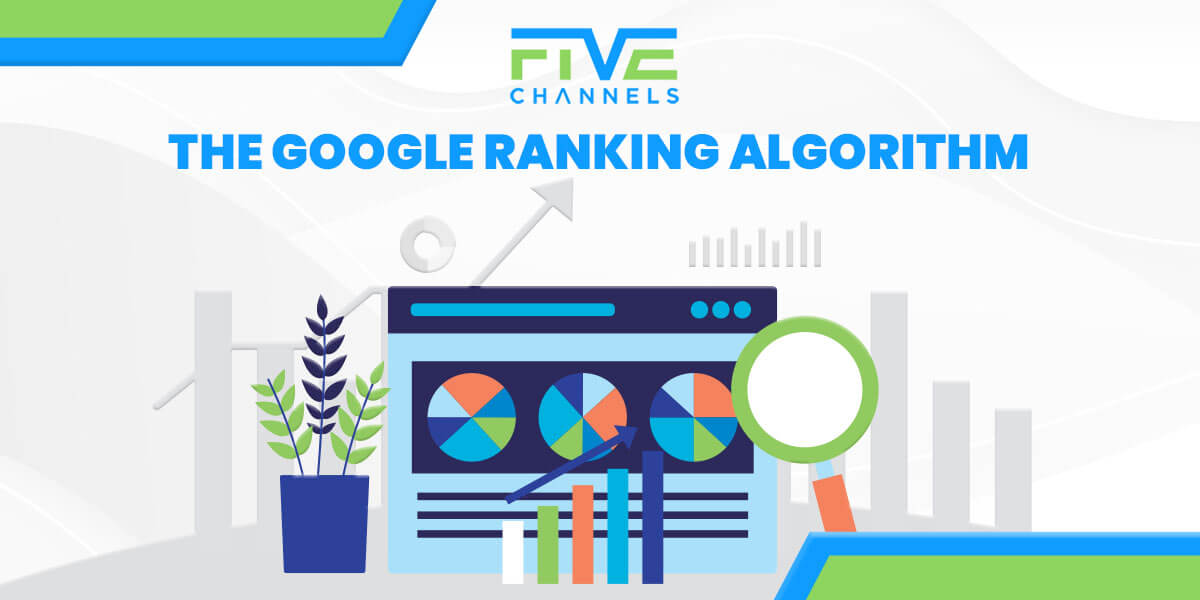Over 90% of online experiences begin with an online search. In fact, search engines drive 300% more traffic than social media. About 60% of users click on one of the top three results.
If your site doesn’t appear at the top of a search engine results page (SERPs), consumers might not find your website online. Page rankings are critical to driving traffic and improving page metrics.
Showing up in a search is often the first way a potential customer or client discovers a business.
Business owners have to keep up with changes in the algorithm to keep ranking on Google, but with the ranking algorithm changing nearly every year and over 200 known factors influencing page authority, how do marketers keep up?
In this Google ranking algorithm guide, we’re going to give you tips to understand the algorithm and how to keep your business on page one.

Should You Worry About Ranking Algorithm Changes?
The short answer is No.
It’s somewhat possible to predict how Google might change its algorithm based on past changes. Unfortunately, there’s no real way to know what these changes could be before they’re announced on official Google channels.
The best way to “beat the algorithm” in this case is to continue producing quality content. If your content responds to a need your audience has and uses best practices for SEO and link building, chances are your ranking won’t be drastically affected.
Since there is no concrete way to plan for Google’s updates, the best thing digital marketers can do is continue building quality website pages.
Ensuring your site is user-friendly and your content directly responds to user needs will keep your ranking consistent. Focusing on building a website’s authority as a subject expert will also help Google recognize its pages as important and improve ranking.
Understanding the Google Algorithm
Before we dive into our Google ranking algorithm tips, it’s important to understand what the algorithm does.
The goal of the Google ranking algorithm is to provide the best, most relevant search results to Google users.
How does it do this?
When a user enters a search term, the algorithm runs the keyword search phrase through all the sites listed in Google’s index. Google then provides users with the most relevant search results to choose from.
The most relevant results are chosen based on several factors. One of the main ways the Google algorithm ranks pages is based on how many times the keyword is used. When Google recognizes that your content is relevant, it will move it higher up in the search results.
This is why it’s important to provide valuable content. When your article provides valuable content related to a particular search term, it’ll rank higher and reach a wider audience.
The Three Stages of Google Ranking
There are three main stages that occur when Google ranks a piece of content. Understanding how the process works will help you understand which factors influence rankings the most.
Stage 1: Crawling
In this stage, Google’s bots (known as “spiders”) crawl the web to find new and existing pages to rank. If a page has lots of links to it, it’ll be easier for Google to find. Pages must be crawled and indexed before they’re ranked.
Stage 2: Indexing
The indexing stage involves Google discovering what each page is about. To do this, Google studies the content, including text, images, and links on a page. Google then stores this information in its index.
Stage 3: Serving
Serving is also known as the ranking stage. This is the stage where Google determines how relevant a page is to a search query and ranks it in the search results.
Google Ranking Algorithm Factors
There are over 200 factors that influence the Google ranking algorithm. Instead of listing all of them, we will highlight sixteen of the most important ones, as listed by SEMRush:
- Direct visits to website
- Time spent on site
- Bounce rates
- Pages per session
- Total backlinks
- Total referral links
- Number of follow backlinks
- Content length
- Website security
- Total anchors
- Keyword used in anchor
- Keyword uses in body
- Keyword density
- Keyword presence in title
- Keyword in meta description
- Videos on page
These are by no means the only factors that influence page ranking. There are some factors that are definitely harder to control, like backlinking and user reviews.
How Google’s PageRank System Works
In many ways, “PageRank” is equivalent to “The Algorithm.” When you hear someone refer to “Google’s search engine algorithm,” they’re largely referring to the PageRank system.
PageRank has earned its title as the most important algorithm in the world. It’s been around since 1998 when Larry Page (whose name is found in “PageRank”) and Sergey Brin introduced the world to Google’s search algorithm. Since then, PageRank has solved trillions of queries for users.
It’s important that you understand the basic idea of PageRank before we get into the specifics of how it operates.
We can think of Google just like we would think of any other business. The company wants to provide a service that’s more useful than other services of its kind. In this case, that service is to provide relevant search engine results.
They’ve been very effective at this, which is why they’re one of the most dominant companies on the planet. That said, the idea is the same. Google wants to make its service as useful as possible to users.
They do this with an ever-evolving PageRank algorithm in addition to other algorithms.
How is PageRank Different From Google’s Other Algorithms?
PageRank holds a particularly important place in the network of Google’s intelligence. It has an effective method of determining importance and relevance. Let’s see how.
Google deals with trillions of web pages. Every time a user makes a search, Google’s AI references the search phrase against all of the pages in its index.
Naturally, Google streamlines the process dramatically by introducing more and more nuances to its algorithm. That said, even a super-refined set of results is bound to be massive when you’re dealing with trillions upon trillions of potential pages.
Imagine the set of relevant results when someone searches “Kardashian,” for example. The trick to narrowing the results is finding a way to identify which relevant results are the most important. This is where PageRank comes in handy.
Link Value as a Measure of Page Importance
The brilliance of PageRank lies in its ability to determine how valuable links are. Further, the value of those links references the importance of the site to which they direct a user. Similarly, outbound links on a particular page express value as well.
The fact that a page has particular links moving to it expresses something to Google’s algorithm. Let’s look at outbound links and inbound links (backlinks) in light of how much value they hold for the algorithm.
Outbound Links
Outbound links, or links going from your site to another site, say a lot about the value of the content on your page.
Say, for example, that you sit down and read two articles. Both of these articles have the same written information and similar levels of writing. They’re both engaging, informative, and interesting.
The only variable is the links on each respective page.
Pages One & Two
On page one, all of the links go to pages like the one you’re reading. They’re relatively interesting pages, but none of them have any source material.
Further, all of the links are outdated and come from unpopular websites. You’ve never heard of these sites, and you’re not inclined to trust them based on their graphic design. The combination of unfavorable elements in the links makes you think less of your original article.
You can’t be sure that article one is telling the truth for a few reasons. For one, you can’t find the source materials directly. Second, you wonder why other people aren’t reading the information on the sites that the links lead to. The lack of social proof there is concerning to you, especially for an article that’s about something serious.
On the second page, you find excellent links that are valuable. You find source materials, scientific studies, and popular sites with great reviews. When you look through the information in these links, you’re confident that it’s accurate.
This confidence makes you happy that you chose page two, and you think you’ll go back to that site again.
PageRank’s Interpretation of Outbound Links
Naturally, Google rewards the pages that have outbound links that help users. Try to think of the page and all of its outbound links as a single resource.
The page with valuable, helpful links is a much more useful resource. Again, Google’s goal is to create search results with the most valuable links according to the keyword phrase in question. That means Google will rank a page with better outbound links higher than one with irrelevant or invaluable links.
Inbound Links (Backlinks)
Any research into important aspects of SEO (search engine optimization) will bring you to the idea of backlinks. These are links to your site from other websites.
They’re sort of the holy grail of optimization, precisely because they’re so important in the context of PageRank. A good way to think about inbound links is to imagine them as votes.
The results of the election determine your site’s position in the SERPs. The more links to your site from other sites you receive, the more votes you have. Every vote doesn’t count equally, though.
Instead, importance holds more weight. So, if you get a link from Nike, The White House, or Google itself, that link will factor heavily in your favor. The more popular and important the source site is, the more valuable the link becomes.
Relevance
A site has to be more than just popular to be valuable, though. It also has to be relevant to the content on your page. There’s a sort of scale that factors popularity and relevance when determining importance. The more relevant and popular, the more important.
Say your website deals with shoe sales. A link from your cousin’s plumbing website isn’t going to hold very much weight. A link from your cousin’s athletic-science website might hold a lot of weight.
A link from Walmart’s website would hold more weight than both of those websites, even though Walmart might not be as relevant as the shoe-science site. Walmart is extremely popular, so it holds a lot of weight.
A backlink from Nike’s website would be incredibly valuable for your small shoe website because the site is massively popular and very relevant to your content.
PageRank uses various data points to determine how valuable these links are. The system uses keywords, traffic counts, and other factors to incorporate your site and its links into the scheme of importance.
Reasoning Behind Backlink Importance
It seems intuitive that more links signify more importance. That said, it’s important to understand why that is.
Social proof is the idea that someone is more likely to engage with a particular idea or practice if they see other people doing the same. For example, you might only buy a product on Amazon if there are more than 1,000 positive reviews.
The reasoning is that other people like this thing, so there’s something about it worth trying. At the very least, it’s more likely to be a good purchase than a product with zero reviews.
PageRank extends this logic by assuming a recommendation from a popular site is one worth listening to. If a powerful site uses a particular link, that particular link must have significant value. At least that’s the reasoning.
Obviously, this isn’t always true. That said, it’s typically true that popular sites that people use put more effort into sourcing decent information that will help readers. Websites are reflections of brand identity and the quality of a business, so businesses have an incentive to keep up the quality of their websites.
As a result, the general trend is that popular and powerful websites link out to useful resources. While there isn’t research on this because it’s sort of an abstract idea, you could bet that websites with higher domain authority tend to link to other sites with high domain authority.
All of this reflects on the site being linked to. If powerful sites are linking to a particular resource, that resource must be valuable and should be ranked higher in the search results.
What is a PageRank Score?
Your PageRank score is a number from 1 to 10 that indicates your website authority based on your link network. The higher the number, the more authority you have.
This number is used to help Google streamline the SERPs and create results that are more effective. You gain points as you accumulate more prestigious links.
The more links you accumulate, the better your score is. You can then contribute to the rankings of other sites when your PageRank score improves. Unfortunately, it’s difficult to see your precise score.
Google doesn’t let you see your ranking score in most cases because it could be used as a Black Hat SEO tactic.
Why Can’t I See My Score?
“Black Hat” tactics are those that try to trick or cheat the algorithm. In the case of PageRank scores, Google had issues early on because they allowed site owners to see their scores.
Soon after, people began selling backlinks at different rates based on their score. If you had a score of 10, for example, you might be able to sell your links for $100 each!
This did nothing to improve Google’s ranking system because it effectively polluted the ranking system with sites that didn’t deserve good scores. Sites that weren’t useful could simply buy backlinks and rise their way up the rankings.
Google stopped showing sites their score for this reason. There are numerous sites that allow you to see a good guess of your score, but it’s likely that you won’t get exactly what Google has.
These sites use algorithms that are based on what professionals assume Google uses. Google keeps a lot of its information close to the chest to preserve the quality of the algorithm.
What is Domain Authority?
Domain authority was originally developed by Moz. Determining your DA score can help you predict how likely your site is to rank on SERPs.
The domain authority score ranges between 1 and 100. Higher scores indicate you have a higher chance of ranking on SERPs. Lower rankings mean you have a lower chance of appearing for searches.
In other words, your DA shows the relevance of your website relative to a topic or your industry.
Note that there’s a difference between domain authority and page authority.
Domain authority considers the ranking strength of your entire domains and subdomains. Page authority, on the other hand, is considered individual pages.
To calculate your domain authority score, Moz considers different factors, including backlinks and linking root domains.
Google uses over 200 different ranking factors to determine your SERP rankings.
You should note that Google doesn’t consider domain authority an important metric when determining your organic rankings. DA doesn’t have an impact on your SERP rankings. Rather, it’s a metric you can use to predict your own rankings.
How is DA Calculated?
There are different tools online that you can use to calculate your domain authority score. Each tool uses its own methodology.
Moz uses over 40 different factors before providing your DA score. For example, it considers the number of websites that link to your site. It also considers the quality of those links.
Moz also considers your link profile, including the internal and external links from the page.
Linking to high authority websites within your posts can help improve your DA. Receiving links from other reputable sites can help too. Moz will consider the number of unique backlinks you’ve generated as well.
In other words, it won’t help to generate multiple links from the same site. Instead, diversify your backlink-building strategy.
Moz will check the trustworthiness of the sites that link to your pages as well. For example, you can get a higher score from large organizations, governmental sites, and university web pages.
To determine your score, Moz will also consider your site structure and user-friendliness. You’ll need to make sure your site is easy for search engines to crawl and index. Your site should also provide a positive user experience to visitors.
What is a Good Domain Authority Score?
Remember, your DA score is ranked on a scale of 1 to 100. If your website is new, it’s likely your DA is low.
When reviewing your DA, consider:
- Anything below 30 is poor
- 30 to 40 is below average
- 40 to 50 is average
- 50 to 60 is good
- 60 to 70 is very good
- Anything above 80 is excellent
You can gain a better understanding of your DA by comparing your DA to other websites for the keywords you’re ranking for. Then, you can boost your DA to rank ahead of the competition.
Why it Matters
Now that we’ve answered what domain authority is, let’s consider how it can impact your business. Here are a few benefits you’ll experience after boosting your domain authority score.
Better Rankings
Remember, about 90% of all online experiences begin with a search engine. However, 75% of search engine users don’t click beyond the first page. Without a high domain authority, people might not visit your website.
You can use search engine optimization (SEO) to improve your organic rankings for specific keywords. When someone searches using that keyword, your content might appear. As you improve your organic rankings, more people will find your website online.
Leads via SEO are eight times more likely to become paying customers than those through traditional ads. Today, over 60% of marketers are prioritizing SEO and their organic presence.
Improving your DA score will help you improve your organic rankings. Then, you can start generating more organic traffic. As you generate more traffic, Google might decide to boost your organic rankings further.
Then, you can continue attracting consumers to your business, which might help you generate more leads and sales.
Since SEO is a cost-effective marketing strategy, you could improve your ROI in the process.
More Brand Awareness
Consumers won’t start shopping from your brand if they don’t realize it exists in the first place. Improving your DA will ensure your site appears for different search queries. Each time you appear in front of a consumer, brand awareness will grow.
Eventually, brand awareness can turn into brand recognition, ensuring you remain top of mind.
When consumers consider shopping from your business in the future, they’ll have an easier time recalling your brand.
More Website Traffic
Increasing your domain authority leads to higher organic rankings, which means more site traffic. As you generate more traffic, consumers will start learning more about your brand. What they learn might encourage them to trust you.
You can start boosting your DA score by sharing high-quality, informative blog posts. These posts can help demonstrate your experience and expertise. Consumers might start seeing you as a thought leader in the industry.
Increased Brand Credibility
A higher DA and higher rankings will position your site ahead of the competition. You’ll start ranking ahead of competitors as a result.
Consumers might feel more inclined to trust your brand if you’re at the top of SERPs. Generating more brand trust might lead to more sales. Then, you can boost your ROI to get leagues ahead of competitors.
Good SEO Parameter
Google updates its search algorithm multiple times each year. These algorithm changes can impact your organic rankings. You can determine if your current SEO strategy is effective by reviewing your DA score.
You can also use your DA score to compare yourself against other competitors within your niche. Then, you can determine new ways to get ahead of the competition.
Recent Changes in the Google Algorithm
Here are some recent updates rolled out by Google:
Product Reviews Update
This is one of Google’s most recent updates, rolling out in April 2022. The goal of this update was to increase product review rankings that shared “in-depth research” instead of content that summarizes a few points about a product.
In-depth research includes information on what the product is like physically, how it is different from its competitors, and comparable products to consider. The idea is that if a review shares these things, the reviewer has spent a significant amount of time studying the product.
Something important to note about this update is that only product review pages are affected. Therefore, there are still some questions as to what counts as a product review, such as a lookbook or roundup page.
The changes in the algorithm mean that depending on the user’s query, a search term that previously turned up a product review could change to a different page.
Link Spam Update
This update, which became active in July 2021, nullifies spam links from across the web over multiple languages.
What does this mean for your site?
If your website has any links that Google deems “spammy,” they’ll drop your page’s ranking. You can remedy this by consistently linking to high-quality content.
Google Ranking Algorithm Tips: 1. Show You’re An Expert
Instead of posting about a variety of topics in the hopes of reaching more readers, niche down. Internet users can use millions of sources to get their questions answered, and you want to make sure they trust your expertise the most.
Choosing a niche will also help guide your content. When you choose a niche, you’ll be able to narrow your keyword search and include the most relevant keywords in your content. As we’ve discussed, keyword use frequency and keyword density are both critical factors in making your page rank on Google.
Producing quality content on one subject will demonstrate to Google that your site has authority and boost your online reputation.
2. Review the Quality of Your Website
Google will rank websites that meet its standards higher in search results. The most important requirements of a website include website speed, functionality, and whether links work. Because those factors influence how easily a user can navigate your site, you need to check those first.
Google also takes into account the user experience. This includes things like the theme you use, the placement of your menu, site architecture, and site map. User engagement and time spent on a page are also key factors that influence your Google ranking.
3. Use Best Practices When Building Links
When you link to other relevant pages on Google, your ranking in the algorithm will increase. Links to other pages that include valuable content help alert Google to the value of your own content.
Even though adding external links is important for rankings, be sure to only add links when the links provide value. Adding irrelevant links will hurt your page. Providing links with value will help your page rank grow over time the longer your website and the sites you link to are on the Internet.
Building links properly will also encourage other content marketers to link to your site. Links from experts in your niche will add votes that will increase your Google rankings.
Keep in mind when you’re building links that there are a lot of myths about proper link building out there. For instance, linking to a domain with lower domain authority than yours doesn’t necessarily mean you shouldn’t use that link on your page.
It’s important to stay away from links with a score below 10 or 20 but using content from new pages won’t negatively impact your ranking.
You also have to be careful when asking people to link to you. If you ask a page to publish your link, you may be penalized by Google.
Asking people to link to your page in exchange for a discount or other arrangement is generally not a good practice. However, if the press writes about you or your services without a direct link, this will not impact your page.
4. Optimize SEO
The best advice we can give you on search engine optimization is to focus on keywords that have the best traffic-to-competition ratio.
It will be hard to compete with high competition keywords used by giants in your niche, so balance between these factors is very important. Choosing a variation of a popular search term that has lower competition will help your page in the long run.
Choosing the right keywords will also alert Google that your page is relevant to a particular search term. Because the goal of Google’s algorithm is to rank the best results to a particular query, it’s essential to perform thorough keyword research.
Fortunately, there are many tools that can aid your keyword research. Moz, Google Keyword Planner, and GrowthBar are all great options.
5. Create Killer Content
Content marketing is three times more effective in terms of leads than outbound strategies. Today, 60% of B2C marketers use content marketing. Over 70% of these marketers say content increases leads.
In fact, over 90% of businesses say content is a valuable business asset. Not many realize that quality content can boost their DA scores too.
Other websites will want to create natural backlinks to your content. Try posting informative, engaging, and unique content this year. Show consumers and bloggers you have information they can’t find elsewhere online.
As other blogs link to your content, you’ll begin generating backlinks. Backlinks can help you learn how to increase domain authority (more on this below).
Consumers can click on the link featured in these blogs to visit your website. Then, you’ll start generating more organic traffic. As you generate more traffic, Google will take notice.
It might boost your organic search engine rankings for those posts, helping you generate more traffic in the future.
About 76% of businesses use organic traffic as a key metric for content success. To generate traffic, however, you need to create content your customers want. Otherwise, they might turn to your competitors instead.
Diversify your content marketing strategy to appeal to different consumers. For example, you can create videos, polls, quizzes, and infographics in addition to blogs. Try personalizing your content to better appeal to your target audience while you’re at it.
How to Keep Up With Google Ranking Algorithm Changes
The truth is, there are almost too many changes in Google’s algorithm per year to count. The best way you can keep up with the constantly changing digital landscape is to understand past changes and follow the best resources.
Great sites that will keep you up to date on Google algorithm changes include:
You can also find information on updates on Google’s official channels. Remember that Google is the best source of information on changes in its algorithm, but our other sources will provide experiential information on how those changes affect pages.
Another way you can be proactive about changes in Google’s algorithm is by checking your page’s traffic and metrics. Be sure to regularly check how your target keywords are performing and use analytics to test your site.
Overall Effects of Digital Marketing
Google algorithm changes might seem like the end of page traffic and amazing site metrics, but in general, most sites don’t see major changes.
To find out about any upcoming algorithm changes, digital marketers can check Google’s official channels. Keeping up with any announcements will help you prepare your pages and make sure your sites meet Google’s standards.
Instead of worrying about little changes in the ranking algorithm, focus your energy on optimizing SEO, site usability, and creating quality content that responds to audience needs.
If you’d like to work with an expert, please contact us and set up a digital marketing review.
Owner and Chief Marketing Officer, Jason Hall, and his team specialize in creating brand awareness / traffic and lead generation / marketing funnel and conversion optimization, while utilizing the appropriate marketing channels available within your industry. With diverse clients throughout the world, Jason's team is well connected within many industries to assist with your marketing strategies. With no long term contracts and various levels of service, Jason's team will increase the quality of your online traffic, leads, and sales.
About the author...
Located in the heart of the Emerald Coast - Destin, FL, founder and Chief Marketing Officer, Jason Hall, and his team specialize in creating brand awareness / traffic and lead generation / marketing funnel and conversion optimization / and PR campaigns, while utilizing the appropriate marketing channels available within your industry.
With diverse clients throughout the world, Jason's team is well connected within many industries to assist with your marketing strategies. With no long term contracts and various levels of service, Jason's team will increase the quality of your online traffic, leads, and sales.









